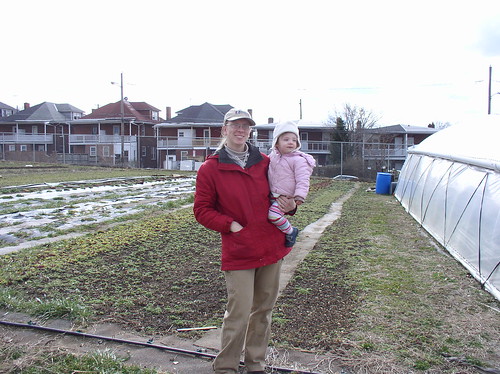Located in the heart of a “food desert” in the city of Harrisburg, Pennsylvania, Joshua Farm is a unique one-acre operation that is growing produce for locals through the use of a seasonal high tunnel.

The high tunnel (also known as a “hoop house”) makes urban farming possible and extends the growing season. Joshua Farm installed its high tunnel with the help of USDA’s Natural Resources Conservation Service (NRCS).
Joshua Farm is managed by Harrisburg residents Kirsten Reinford and Joshua Mortiz. It grows over 40 varieties of fresh produce for over 45 local families. In just seven years, Joshua Farm has made a substantial impact on the community.
The farm is a Community Supported Agriculture (CSA) business, where members share in the farm’s expenses in exchange for a portion of the harvest. Joshua Farm also allows members to provide volunteer labor as payment for CSA shares.
The longer growing season the high tunnel enables allows both the farm and its shareholders to benefit from higher productivity. The result is that Joshua Farm has fresh fruits and vegetables from May through October. Shareholders receive a harvest selection on a weekly basis during the 22-week growing season.
Joshua Farm is part of Joshua Group, a non-profit that offers tutoring, mentoring and scholarships to underprivileged students. Through the farm, the organization teaches inner-city students where food comes from and how to grow food. The farm also employs up to six students and offers small cooking classes for young people.

Thanks to a separate USDA grant, Joshua Farm also sells organic produce directly to local residents using Supplemental Nutrition Assistance Program (SNAP) benefits, formerly called food stamps, through the use of a swipe card machine.
Joshua Farm provides a model for meeting food needs in an underserved community. But all communities benefit from stronger connections to food systems, and from having access to fresh, local produce.
USDA supports local and regional food systems across the U.S. through its Know Your Farmer, Know Your Food Initiative and Compass. The Know Your Farmer, Know Your Food Compass is an online multimedia narrative with stories, pictures and an interactive map of USDA-supported activities in all 50 states.
With the Compass, you can navigate USDA resources for food; meet farmers, ranchers, businesses and communities that are participating in local food chains; and learn about local and regional food projects across the country.
Find out more about the High Tunnel Initiative.
Follow NRCS on Twitter.
Check out other conservation-related stories on the USDA blog.
